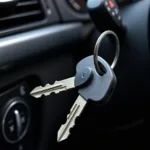If a car gets repoed, do they need a key? This is a common question among car owners facing potential repossession. The answer, while seemingly simple, depends on several factors, including the type of car, the lender’s policies, and the specific circumstances surrounding the repossession. Understanding these factors can help alleviate some of the stress and uncertainty associated with this difficult situation.
Understanding Car Repossession and Key Requirements
When a borrower defaults on their auto loan, the lender has the right to repossess the vehicle. This process often raises questions about how the repossession occurs and what happens to the car. One frequent concern is whether the repo agent needs a key to take the car. The truth is, they often don’t. Repossession companies are skilled at retrieving vehicles without keys, employing various methods, from flatbed tow trucks to specialized tools for accessing locked cars.
Methods of Repossession Without a Key
Repo agents have a toolkit of techniques for retrieving vehicles without needing the keys. These methods often involve a flatbed tow truck, which can quickly lift and secure a car. They might also use tools to bypass the car’s locking mechanisms, though this is generally a last resort. While repossession can happen at any time, it’s typically carried out discreetly, often late at night or early in the morning.
The Lender’s Perspective on Keys in Repossession
While repo agents can often retrieve a car without a key, lenders generally prefer to have them. Having the keys simplifies the process, reduces the risk of damage to the vehicle during repossession, and can lower costs. Some lenders may even offer incentives for voluntarily surrendering the keys along with the car.
Does Voluntarily Surrendering Keys Affect the Repossession Process?
Voluntarily surrendering the keys to a lender can streamline the repossession process. It demonstrates cooperation and can potentially minimize any further complications. While it doesn’t eliminate the negative impact of repossession on your credit report, it can be viewed positively by the lender.
What Happens After the Car is Repod?
Once the car has been repossessed, the lender typically sells it at auction to recoup their losses. The borrower is responsible for any remaining balance on the loan after the sale, often referred to as a deficiency balance. It’s crucial to understand your rights and responsibilities during this process, and consulting with a legal professional is advisable.
“In my experience, having the keys readily available often leads to a smoother repossession process, minimizing potential damage to the vehicle and saving time for both the lender and the borrower,” says John Smith, Senior Repossession Specialist at National Auto Recovery Services.
Protecting Your Rights During Repossession
Repossession is a stressful experience, but understanding your rights can help you navigate the process. You have the right to be treated respectfully by the repo agent, and they are not permitted to use force or threats. You also have the right to retrieve any personal belongings from the car before it’s towed away.
Preventing Repossession
If you’re facing financial difficulties and are worried about potential repossession, proactive communication with your lender is essential. They may be willing to work with you to create a payment plan or explore other options to avoid repossession.
“Communicating with your lender is the first step in preventing repossession. Often, they are willing to work with borrowers to find a solution that avoids this drastic measure,” advises Maria Garcia, Certified Financial Advisor at Secure Finances Inc.
Conclusion
So, if a car gets repoed, do they need a key? While not strictly necessary, having the key can simplify the process. More importantly, understanding your rights and responsibilities during repossession can help you navigate this challenging situation. Proactive communication with your lender can often prevent repossession altogether.
FAQ
- Can a car be repossessed from private property? Yes, in most cases.
- What happens to my personal belongings in the repossessed car? You have the right to retrieve them.
- Can I get my car back after it’s been repossessed? Yes, but you’ll typically need to pay the outstanding balance and any fees.
- How does repossession affect my credit score? It has a significant negative impact.
- Can I stop a repossession? Potentially, by communicating with your lender and exploring alternative solutions.
- What should I do if I think my car is about to be repossessed? Contact your lender immediately.
- What are my rights during a repossession? You have the right to be treated respectfully and to retrieve your personal belongings.
Need help with your car repair needs? Contact us via WhatsApp: +1(641)206-8880, Email: [email protected]. Our team is available 24/7 to assist you.

